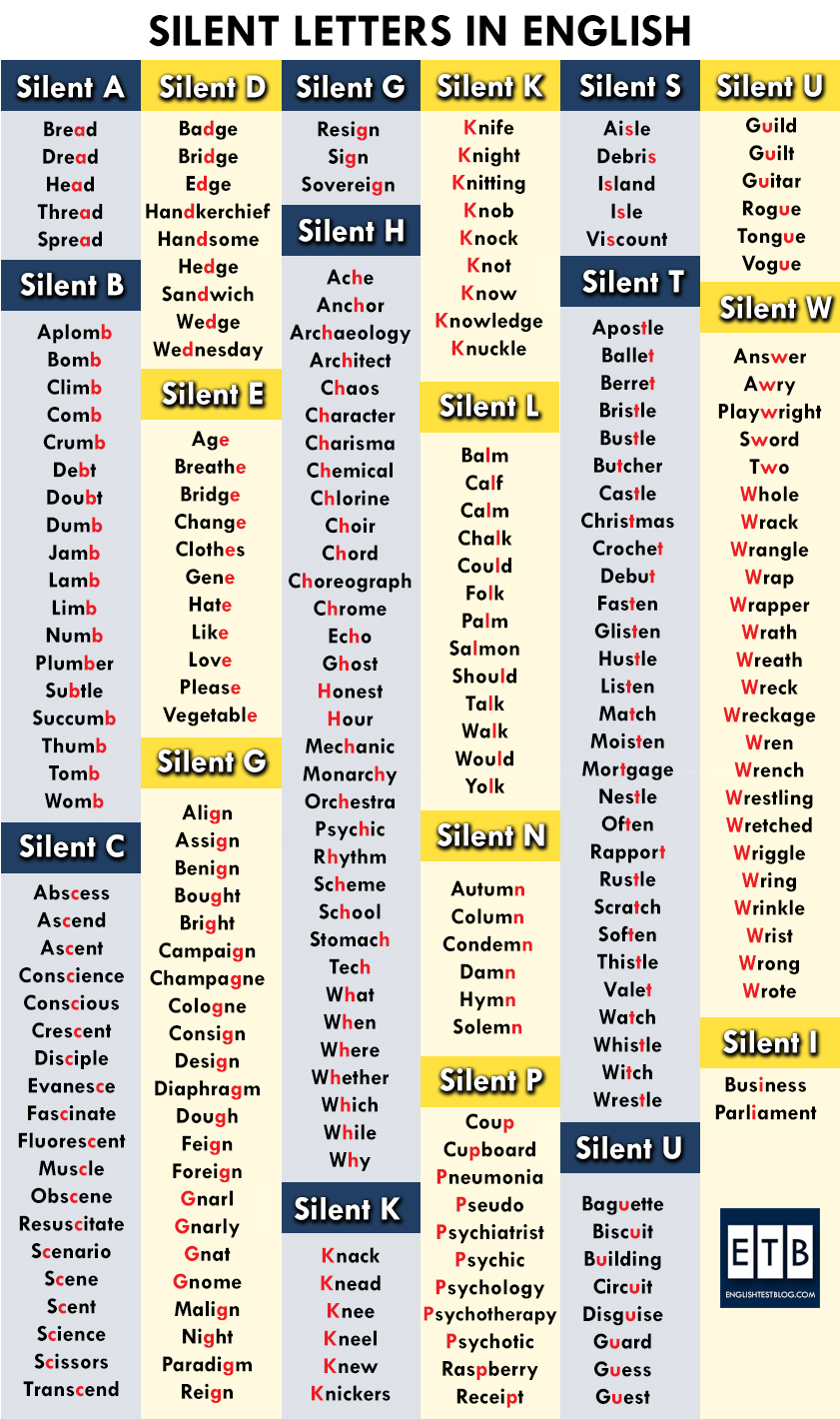Silent letters in English are letters that are written but not pronounced in a word. Some common examples of silent letters include the "k" in "knight", the "b" in "comb", and the "h" in "hour". Almost every letter of the alphabet can be silent.
Why are there silent letters?
Silent letters may seem unnecessary, but they have a purpose in the word. Here are some common purposes of silent letters:
1. To distinguish between homophones: Silent letters can be used to distinguish between homophones, which are words that are pronounced the same but have different meanings. For example, the words "night" and "knight" have different meanings, but are pronounced the same way. The silent "k" in "knight" helps to distinguish it from the word "night".
2. To change the pronunciation of other letters: Silent letters can sometimes affect the pronunciation of other letters in English. For example, in the words "sign" and "gnome", "g" is silent, but it changes the pronunciation of the vowel sounds "i" and "o". In "sign", the "g" makes the "i" sound like "ahy", while in "gnome", the "g" makes the "o" sound like "oh".
Silent letters can also sometimes affect the stress or emphasis on certain syllables in a word. For example, the "k" in "know" is silent, but it helps to emphasize the first syllable of the word (as in "NOH" rather than "NO").
3. To reveal a word's origin: Silent letters in words can be a clue to a word's origin. They often reflect the word's etymology and historical roots. For example, words with a silent "k", such as "knife" and "knee", were originally pronounced with a "k" sound in Old English, but the pronunciation evolved over time. Words with a silent "P", such as "psychology" and "pneumonia", come from Greek where "p" was pronounced.
Words with Silent Letters | Pronunciation Video
Words With Silent Letters
Words with Silent A
- Bread
- Dread
- Head
- Thread
- Spread
Words with Silent Letter B
- Aplomb
- Bomb
- Climb
- Comb
- Crumb
- Debt
- Doubt
- Dumb
- Jamb
- Lamb
- Limb
- Numb
- Plumber
- Subtle
- Succumb
- Thumb
- Tomb
- Womb
Words with Silent Letter C
- Abscess
- Ascend
- Ascent
- Conscience
- Conscious
- Crescent
- Disciple
- Evanesce
- Fascinate
- Fluorescent
- Muscle
- Obscene
- Resuscitate
- Scenario
- Scene
- Scent
- Science
- Scissors
- Transcend
Words with Silent Letter D
- Badge
- Bridge
- Edge
- Handkerchief
- Handsome
- Hedge
- Sandwich
- Wedge
- Wednesday
Words with Silent Letter E
- Age
- Breathe
- Bridge
- Change
- Clothes
- Gene
- Hate
- Like
- Love
- Please
- Vegetable
Words with Silent Letter G
- Align
- Assign
- Benign
- Bought
- Bright
- Campaign
- Champagne
- Cologne
- Consign
- Design
- Diaphragm
- Dough
- Feign
- Foreign
- Gnarl
- Gnarly
- Gnat
- Gnome
- Malign
- Night
- Paradigm
- Reign
- Resign
- Sign
- Sovereign
Words with Silent Letter H
- Ache
- Anchor
- Archaeology
- Architect
- Chaos
- Character
- Charisma
- Chemical
- Chlorine
- Choir
- Chord
- Choreograph
- Chrome
- Echo
- Ghost
- Honest
- Hour
- Mechanic
- Monarchy
- Orchestra
- Psychic
- Rhythm
- Scheme
- School
- Stomach
- Tech
- What
- When
- Where
- Whether
- Which
- While
- Why
Words with Silent Letter I
- Business
- Parliament
Words with Silent Letter K
- Knack
- Knead
- Knee
- Kneel
- Knew
- Knickers
- Knife
- Knight
- Knitting
- Knob
- Knock
- Knot
- Know
- Knowledge
- Knuckle
Words with Silent Letter L
- Balm
- Calf
- Calm
- Chalk
- Could
- Folk
- Palm
- Salmon
- Should
- Talk
- Walk
- Would
- Yolk
Words with Silent Letter N
- Autumn
- Column
- Condemn
- Damn
- Hymn
- Solemn
Words with Silent Letter P
- Coup
- Cupboard
- Pneumonia
- Pseudo
- Psychiatrist
- Psychic
- Psychology
- Psychotherapy
- Psychotic
- Raspberry
- Receipt
Words with Silent Letter S
- Aisle
- Debris
- Island
- Isle
- Viscount
Words with Silent Letter T
- Apostle
- Ballet
- Berret
- Bristle
- Bustle
- Butcher
- Castle
- Christmas
- Crochet
- Debut
- Fasten
- Glisten
- Hustle
- Listen
- Match
- Moisten
- Mortgage
- Nestle
- Often
- Rapport
- Rustle
- Scratch
- Soften
- Thistle
- Valet
- Watch
- Whistle
- Witch
- Wrestle
Words with Silent Letter U
- Baguette
- Biscuit
- Building
- Circuit
- Disguise
- Guard
- Guess
- Guest
- Guild
- Guilt
- Guitar
- Rogue
- Tongue
- Vogue
Words with Silent Letter W
- Answer
- Awry
- Playwright
- Sword
- Two
- Whole
- Wrack
- Wrangle
- Wrap
- Wrapper
- Wrath
- Wreath
- Wreck
- Wreckage
- Wren
- Wrench
- Wrestling
- Wretched
- Wriggle
- Wring
- Wrinkle
- Wrist
- Wrong
- Wrote

Comments
Post a Comment